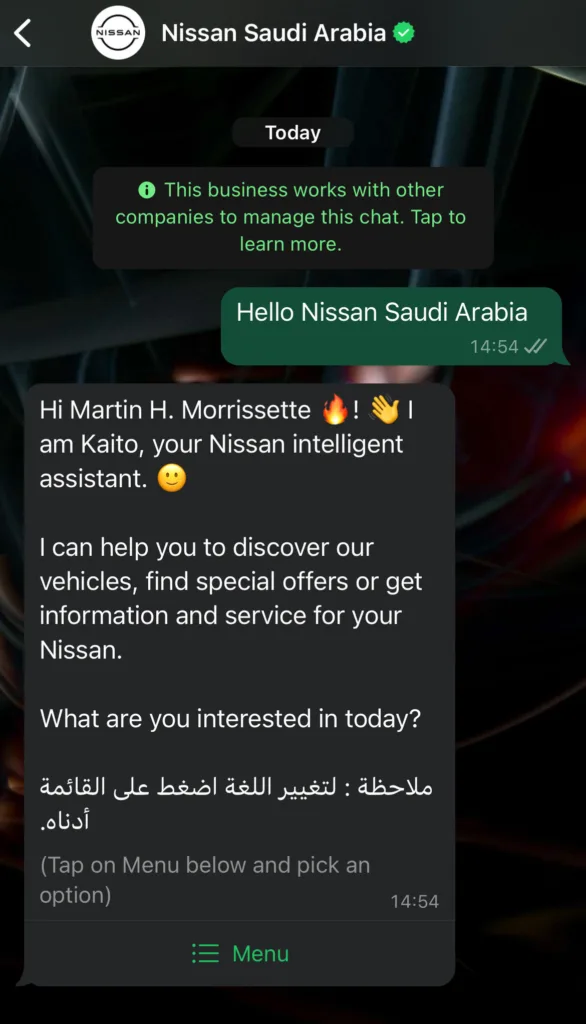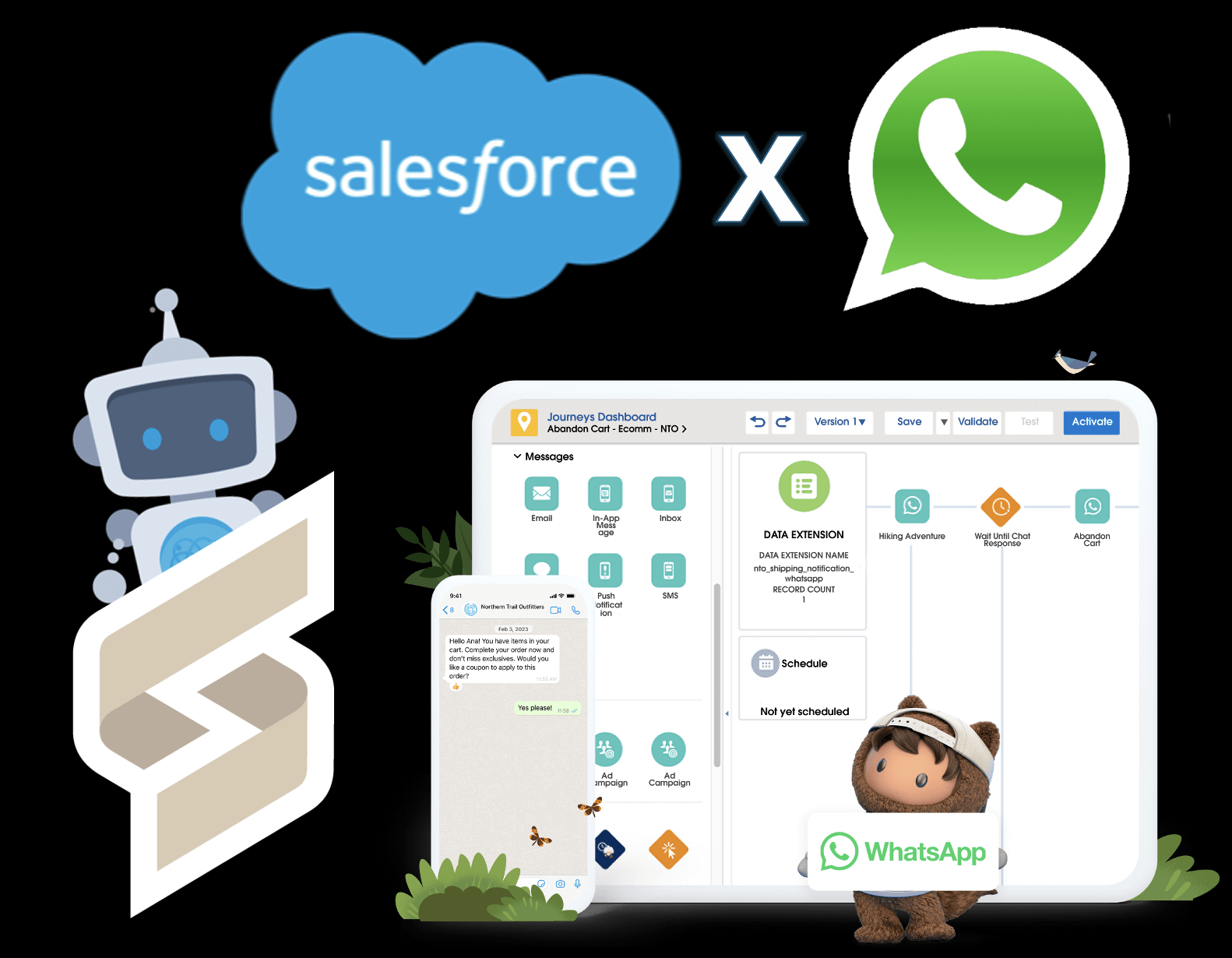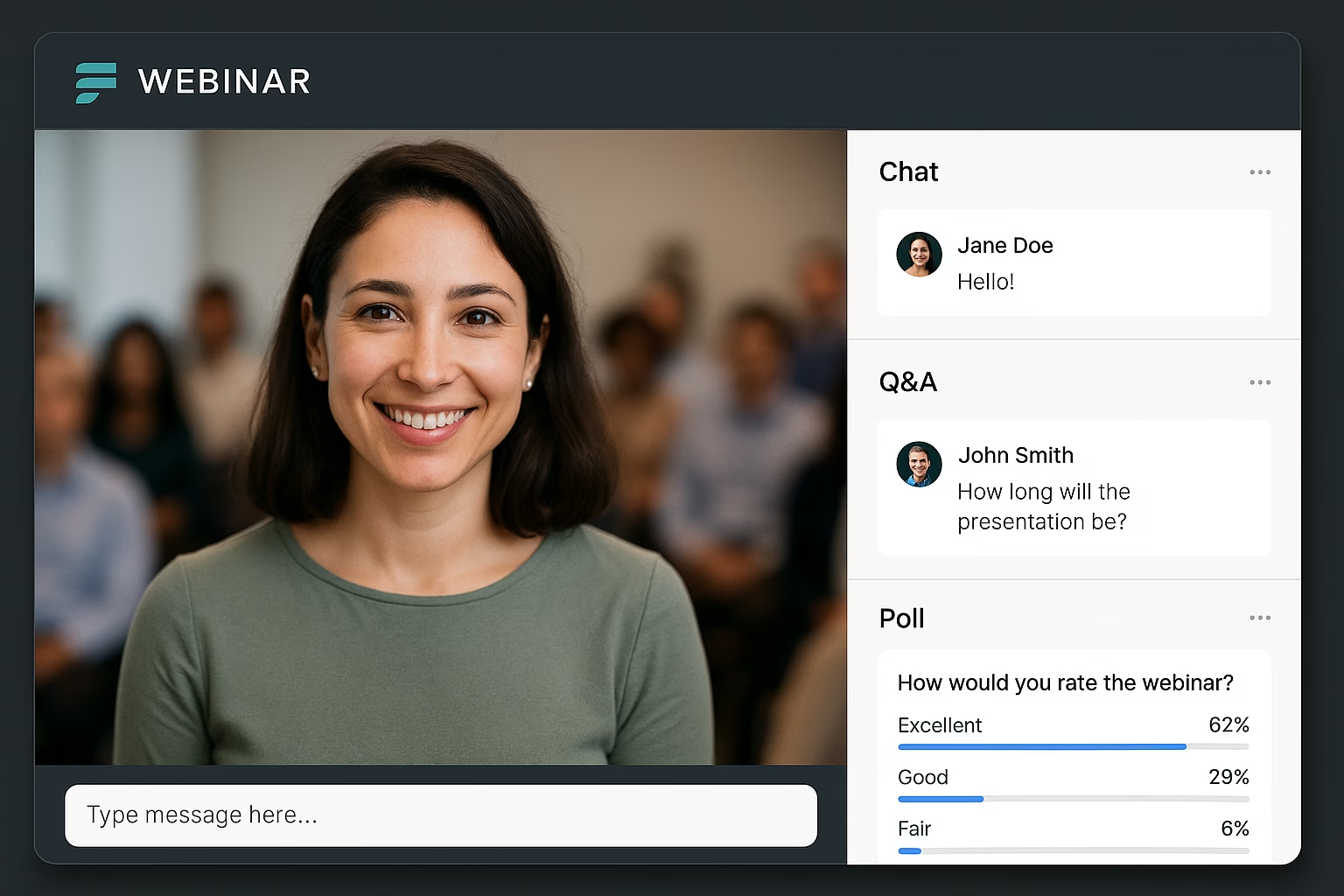By Martin H. Morrissette, Sirocco CMO – Book time with me
Businesses like yours are constantly exploring innovative ways to connect with their customers. One platform that stands out is WhatsApp. With its extensive reach and user-friendly features, WhatsApp has evolved from a simple communication channel into a powerful tool for marketing and customer service. This blog post highlights the advantages of incorporating WhatsApp into your business operations and how Sirocco can assist you in harnessing these benefits.
Salesforce has been offering a robust WhatsApp integration since the Spring Release of 2020. Whether you’re operating domestically or internationally, your customers can reach your support centre through the world’s most popular messaging app. This integration allows your agents to interact with customers over WhatsApp, similar to SMS text messages or Facebook Messages. Additionally, your business can send templated notifications to customers, such as appointment updates or shipment notifications, and use WhatsApp in your marketing efforts. Did you know nearly 90% of people respond on WhatsApp within 30 minutes, compared to only 17% within the same time frame for emails?
The penetration of WhatsApp as a communication channel varies across regions, which means that leveraging WhatsApp could still set your business apart from the competition, even if you’re just starting out. Our Sirocco Arabia team recently attended the Salesforce World Tour Essentials in Dubai and drew a lot of interest in our WhatsApp offerings from local businesses in the UAE. Our team was not surprised this would be a popular topic. WhatsApp is widely used in the United Arab Emirates. As of 2024, WhatsApp is the most popular social media platform in the UAE, with 85.8% of the population aged between 16 and 64 using it1. In fact, WhatsApp has approximately 5.66 million active users in the UAE. Social media in general has become very popular in the UAE, with 99% (i.e., 10.14 million) of the UAE’s total population being internet users. According to Statista, the average daily time spent on social media in the UAE is 2 hours and 58 minutes. WhatsApp’s popularity in the UAE can be attributed to a largely young demographic and a high proliferation of smartphones. The fact that social media user identities exceed the total population of the UAE (10.24 million) is a testament to the fact that social media is a part of the everyday lives of UAE citizens. These statistics also show that WhatsApp is a key part of the communication landscape in the UAE, making it a valuable platform for businesses like yours to connect with their customers.
What is WhatsApp?
WhatsApp is a cross-platform, end-to-end encrypted instant messaging service for mobile devices and PCs. As of 2023, it is the most popular mobile messenger app worldwide, boasting approximately two billion monthly active users. WhatsApp allows users to share text, images, video, and voice messages and supports voice and video calling. In 2014, Meta (formerly Facebook) acquired WhatsApp for nearly $20 billion. This acquisition aligned with Meta’s vision of providing more affordable and efficient internet access worldwide. Despite having its own chat portal, Facebook Messenger, WhatsApp has emerged as Meta’s most successful messaging app. Gartner predicts that 80% of customer service organizations will abandon native mobile apps in favour of messaging by 2025. With more than two billion people using WhatsApp, it’s how people around the world connect with friends, family and now, businesses.
Why use WhatsApp?
WhatsApp’s global usage is staggering. For instance, as of April 2022, around nine in ten messaging app users in Brazil were engaging with WhatsApp. In 2021, WhatsApp’s user base in Sweden amounted to approximately 2.59 million users. In Italy, WhatsApp is the most used messenger and chat app, with virtually all respondents (>97%) engaging with the app as of 2022. In Spain, a survey from March 2023 showed that 65% of WhatsApp users accessed the platform several times a day. In the USA, there were 68.1 million mobile phone users accessing WhatsApp in 2019, a figure that grew to 85.8 million users in 2023. Additionally, more than half of American WhatsApp users access the service daily. Globally, more than 100 billion messages are sent each day on WhatsApp. These statistics show that WhatsApp is a key part of the communication landscape in many regions, making it a valuable platform for your business to connect with your customers, using one of their preferred channels.
WhatsApp in your Marketing
WhatsApp offers several intriguing possibilities for marketing. Your business can create personalized marketing campaigns, reaching customers directly on their phones. This direct communication fosters a personal connection between your business and your customers, enhancing customer loyalty and engagement. Furthermore, you can use WhatsApp to share creative content, such as product updates and geo-fenced promotional offers, keeping customers engaged and informed. However, WhatsApp requires your brand to have explicit opt-in from your customers to send messages. You must store and manage customers’ opt-in information carefully. If a customer believes that they didn’t opt-in to receive messages, they can block or report your business, which affects your quality score and limits your messaging capabilities. Therefore, a solid consent process is crucial (we can help with that, too).
WhatsApp in your Customer Service

Unsurprisingly, WhatsApp can be an exceptional channel for your customer service as well. It enables your business to provide real-time support, resolving issues quickly and efficiently. The familiarity of WhatsApp makes it easy for customers to reach out for support, enhancing their overall experience. Compared to traditional customer service channels, WhatsApp can be more cost-effective, making it an attractive option for businesses of all sizes. Your agents and enhanced bots can send messages in multiple formats, including voice messages, various file types, and questions with clickable options. If an agent cannot help a customer, they can transfer the customer to another agent, queue, or Omni-Channel routing flow, or mark the session inactive if the customer stops responding. Features such as read and delivery receipts, typing indicators, flag raise, and supervisor whisper help agents manage their workload more effectively. Agents can also initiate messaging sessions with customers, while admins can use flows to send automated notifications based on approved WhatsApp templates.
Getting started
Before diving into the technical details of integrating WhatsApp with Salesforce, it’s crucial to establish how WhatsApp fits into your comprehensive communication strategy. This strategy should outline your business’s goals, target audience, and key messages, considering the unique characteristics and preferences of your audience. Remember, technology is just a tool; how you use it truly makes a difference. A well-thought-out communication strategy will ensure you’re using WhatsApp effectively to engage with your customers, build strong relationships, and drive your business forward. Once your strategy is in place, focus on the technical aspects of integration. We are here to assist you every step of the way, from strategy development to technical setup and beyond. Setting up WhatsApp with Salesforce is straightforward. Ensure that you have a Facebook Business Manager account. Then enter Messaging in the Quick Find box and select Messaging Settings. Click “New Channel” to open the guided setup flow and set up your WhatsApp channel. Follow the prompts, enter credentials, and you’re almost good to go. Prerequisites for the integration are:
- You need a Salesforce account with admin access
- An active WhatsApp Business account
- WhatsApp Business API access
- Salesforce’s Messaging Channel for WhatsApp set up

Our team is experienced in helping organizations with the strategy and setup so you can use this popular channel within a couple of weeks. We specialize in helping Salesforce customers integrate WhatsApp into their marketing and customer service strategies! If you’re interested in learning more about how we can help you leverage WhatsApp for your Salesforce platform, please reach out to book a free demo or workshop.
Salesforce Einstein Bots
Another cool feature our team showcased at the World Tour Essentials in Dubai was Salesforce Einstein Bots – AI-powered chatbots built natively on the Salesforce Platform. They can be synchronized with existing processes, automating routine tasks and providing real-time insights. The bots can be manually configured, trained with existing data, and users can provide feedback, ensuring continuous learning. Chatbots on WhatsApp can handle customer queries, improving client experience and reducing the workload for your human agents. Here are some best practices for using chatbots on WhatsApp:
- Ensure that the chatbot’s responses are concise and easy to understand
- Provide an option for customers to speak to a human agent if needed
- Regularly update the chatbot’s knowledge base and train it with new data to improve its accuracy and relevance
- Continuously analyze and optimize the chatbot’s performance
Some benefits of using a WhatsApp bot in your customer service include:
- Fast, 24/7 Customer Service: Your customers want fast and easy service, even during peak hours. WhatsApp bots can provide global, 24/7 support at the most convenient time for the customer, even when your CS agents are offline.
- Personalised experiences: WhatsApp bots can use relevant information to deliver personalised experiences. They can collect customer information upfront, making your customer service faster and more efficient.
- Improved productivity: WhatsApp bots can handle multiple requests for information and contacts, thereby increasing efficiency and productivity.
- Secure customer connections: With end-to-end encryption in WhatsApp, consumer connections are more comfortable and safe.
- Real-Time responses: WhatsApp bots can give real-time responses to customer queries and complaints, send updates on the status of tickets and their resolution and gather feedback from customers.
- Streamlined customer experience: WhatsApp bots can help streamline your contacts and optimise the customer experience.
Remember, the key to a successful WhatsApp bot is to ensure it’s programmed to answer certain questions and allow the tool to combine the inputs received with the requests, in order to find the best solution for each query.
Some brand examples of using WhatsApp for Business
Here are examples of companies using WhatsApp for marketing or customer service (source: Sprout). KLM uses WhatsApp’s business application to provide customers with flight updates and booking confirmations. Absolut Vodka created a campaign for the launch of their Limited-Edition Absolut Unique collection in Argentina, involving a virtual bouncer named Sven whom people could message to get tickets to the launch party. Hellmann’s Mayonnaise in Brazil engaged customers uniquely by having them send pictures of their refrigerators, with chefs responding with recipes based on the ingredients they had on hand.
We believe incorporating WhatsApp into your Salesforce strategy can supercharge your customer engagement and service capabilities. Our Sirocco teams are ready to help you navigate Salesforce x WhatsApp integration, ensuring you get the most out of this powerful connection. When is a good time to discuss your WhatsApp plans and demo our solution?










